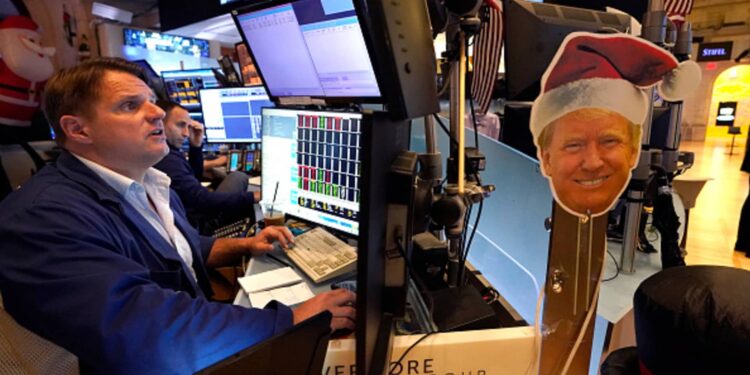The Dow Jones Industrial Average can’t get it together lately. The 30-stock average fell for an eighth straight session on Monday, continuing its pullback since closing above 45,000 for the first time ever on Dec. 4. This also marked its longest losing streak since another eight-day slide that ended June 21, 2018. For context: The Dow was trading at 24,461.70 back in 2018 — less than half its value as of Monday’s close. Sentiment at the time was getting hurt by the Trump administration’s escalating trade war with China, dragging down many of the Dow stocks tied to the global economy . The culprit this time around appears to be a rotation out of cyclical stocks closely tied to the fortunes of the economy and into more technology-focused names. Chevron is down more than 6% since the streak began, while Sherwin-Williams and Caterpillar have lost 5.2% and 4.1%, respectively. Many of these stocks got a boost after President-elect Donald Trump was elected in November, as investors anticipated lower taxes and deregulation lifting profits. Amazon , meanwhile, has climbed 5.6% since the Dow started falling — with Apple and Microsoft advancing 3.3% and 2%, respectively. “The market’s underlying mood has been deteriorating for a few days, and it crumbled further on Monday, with investors growing increasingly concerned about poor breadth and shifting their focus away from Trump’s virtues (deregulation, tax relief) and toward his potential headwinds (higher deficits, tariffs, etc.),” wrote Adam Crisafulli of Vital Knowledge. “The approaching pivot in Fed policy is another factor feeding into the more cautious narrative, with the market pricing in a dramatic slowdown in the pace of easing,” he added. Another headwind for the Dow has been UnitedHealth . On top of the scrutiny around the health insurance industry that’s followed the murder of UnitedHealthcare CEO Brian Thompson, the stock has taken a hit as Trump signals a push to “knock out” pharmacy benefit manager companies. “We have a thing called the middleman,” Trump told reporters on Monday. “You know the middleman, right? The horrible middleman that makes more money frankly than the drug companies, and they don’t do anything except they’re a middleman. … We’re going to knock out the middleman.” UnitedHealth is the biggest laggard during the Dow’s latest decline, down 13.9% in that time. Yet the rotation out of cyclicals and into tech hasn’t been uniform. Industrial giants Boeing and Honeywell are up 10% and 4.3%, respectively, since the benchmark’s slide began. All the while, Nvidia has been conspicuously absent from tech’s upward move within the Dow, losing 9% since Dec. 5. The chipmaker has also fallen into a correction, down more than 10% from a record close set Nov. 7. To be sure, the damage suffered during this latest downdraft has been contained. The Dow’s down just 2.3% in that time. However, if these losses mount, it would put a damper on market sentiment heading into the new year. “The bigger concern, and this is likely more of a January story, is whether the weakness in value/cyclicals is foretelling of something more ominous,” said Jonathan Krinsky, chief market technician at BTIG, in a note. The Dow hasn’t seen a nine-day losing streak since 1978, when Jimmy Carter was president.







